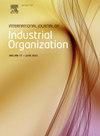Optimal equity split under unobservable investments
IF 1.4
3区 经济学
Q2 ECONOMICS
International Journal of Industrial Organization
Pub Date : 2025-01-01
DOI:10.1016/j.ijindorg.2024.103132
引用次数: 0
Abstract
This paper examines the optimal equity split between a penniless entrepreneur (E) and a deep-pocketed venture capitalist (V) cooperating in a two-stage investment project. The first-stage investment explores project profitability, and the final success probability is a function of V's unobservable investment amount, E's and V's private effort like the Cobb-Douglas production function. We show that if project profitability is good enough, the optimal equity split and the welfare loss rate arising from moral hazard are explicitly determined by the project inputs' output elasticities, independent of project profitability and inputs' costs. If project profitability is not contractible, we propose a new renegotiation mechanism. The renegotiation is profitable only when V's participation constraint is not met. We identify the thresholds determining whether E should abandon the project, whether E should go ahead without any changes, and whether E should increase V's equity or roll back cash to V. We show that the initial wealth transferred from V to E can be appropriated upon renegotiation to realize a Pareto improvement; our model provides a novel explanation why internal financing is preferred.
不可观察投资下的最优股权分割
本文研究了在一个两阶段投资项目中,一个身无分文的企业家(E)和一个财力雄厚的风险投资家(V)之间的最优股权分配。第一阶段投资考察的是项目盈利能力,最终成功概率是V的不可观测投资金额、E和V的私人努力的函数,如柯布-道格拉斯生产函数。研究表明,当项目盈利能力足够好时,最优股权分割和道德风险引起的福利损失率由项目投入的产出弹性明确决定,而与项目盈利能力和投入成本无关。如果项目盈利能力不可收缩,我们提出一个新的重新谈判机制。只有当V的参与约束不满足时,重新协商才有收益。我们确定了决定E是否应该放弃项目、E是否应该不做任何改变地继续下去、E是否应该增加V的股权或回拨现金给V的阈值。我们表明,从V转移到E的初始财富可以在重新谈判后被分配,以实现帕累托改进;我们的模型提供了一个新颖的解释,为什么内部融资是首选。
本文章由计算机程序翻译,如有差异,请以英文原文为准。
求助全文
约1分钟内获得全文
求助全文
来源期刊
CiteScore
2.50
自引率
6.70%
发文量
48
审稿时长
77 days
期刊介绍:
The IJIO is an international venture that aims at full coverage of theoretical and empirical questions in industrial organization. This includes classic questions of strategic behavior and market structure. The journal also seeks to publish articles dealing with technological change, internal organization of firms, regulation, antitrust and productivity analysis. We recognize the need to allow for diversity of perspectives and research styles in industrial organization and we encourage submissions in theoretical work, empirical work, and case studies. The journal will also occasionally publish symposia on topical issues.

 求助内容:
求助内容: 应助结果提醒方式:
应助结果提醒方式:


